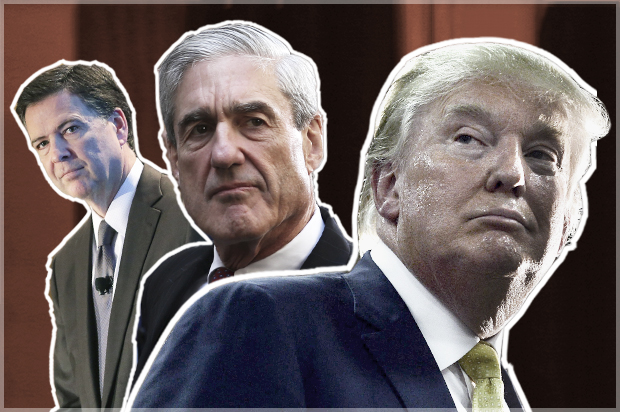We all breathed a big sigh of relief when the Justice Department finally appointed Robert Mueller as the special counsel to investigate the potential collusion between Donald Trump’s presidential campaign and Russia’s meddling in the election.
But we are not out of the woods yet. The president possesses a lot of power, and a president willing to abuse his power could still wreak havoc on our constitutional democracy and significantly undermine the investigation.
[salon_video id=”14775332″]
Here is a brief rundown of the maneuvers that might be attempted by a devious president:
Fire Robert Mueller
Just as Trump fired the former head of the investigation, FBI Director James Comey, he could also fire the new head of the investigation, Robert Mueller. The applicable regulations vest the power to fire the special counsel in the president’s Justice Department.
Some say that Trump would never go so far as to fire Mueller because this would be outrageous. Really? It was outrageous for Trump to fire Comey in the first place. So he could very well do it again.
In fact, Trump already has an excuse. Mueller and Comey were former colleagues in the Justice Department and have been friends for years. So Trump could protest that the investigation is fatally biased because the man he fired has been replaced by his own good buddy, who then is investigating the man who fired him.
Fire Rod Rosenstein
Trump could also fire Rod Rosenstein, the deputy attorney general who appoints and supervises the special counsel. (The attorney general would normally serve in this capacity, but Attorney General Jeff Sessions has recused himself due to his own Russian contacts during Trump’s presidential campaign.)
If Trump fires Mueller for being biased, then Trump could also fire Rosenstein at the same time for having appointed a biased investigator. Then Trump could handpick Rosenstein’s replacement, and that person in turn could appoint a new special counsel more favorable to Trump (or appoint none at all).
Congressional witness immunity
If Trump could wrangle congressional Republicans into cooperating with his schemes, they could abuse their powers to help stymie the investigation. Congress possesses the power to grant immunity from future prosecution to witnesses in exchange for their testimony to Congress. A grant of immunity requires the vote of the full House or Senate, or a two-thirds vote of a congressional committee.
Ordinarily, a witness would never be granted immunity unless that witness promised in exchange to provide extremely damaging testimony, typically significant enough to convict someone else higher up in the criminal enterprise.
But in an underhanded Trump scheme, congressional Republicans could grant immunity to witnesses like Michael Flynn and Paul Manafort in exchange for mere harmless testimony. This way, the witnesses would walk away scot-free without ever having to provide damning testimony against Trump.
Such congressional immunity would greatly undermine the power of the special counsel by removing his ability to squeeze witnesses by threatening them with prosecution.
Moreover, having Congress do the dirty work would be great for Trump because then he would not need to expend his own political capital and risk a backlash for abusing his executive power.
Waging legal battles
Trump could also hinder the investigation by turning to his favorite pastime of waging endless legal battles. Not only might he refuse to cooperate, but he could also let loose legions of lawyers to fight the investigation at every step of the way.
Reports have already emerged that Trump’s lawyers are researching whether they can use arcane legal rules to disqualify Mueller from investigating two key subjects, Manafort and Jared Kushner, Trump’s son-in-law and adviser. These legal rules were designed to prevent lawyers from joining the government and then turning on their former clients and investigating them. But the rules should clearly be waived by the Justice Department in circumstances like this one, where no risk of abuse is present.
Inadequate resourcing
The special counsel is dependent upon the Justice Department to sufficiently fund a thorough investigation. Because Trump controls the Justice Department, he could find a way to restrict the resources available to the investigation.
Revoke the special counsel regulations
Mueller was appointed as special counsel pursuant to internal regulations of the Justice Department. These regulations do not constitute a full law enacted by Congress. Such a law had previously been enacted by Congress in the aftermath of the Watergate scandal. It was used in such investigations as the Iran-Contra affair under President Ronald Reagan and the Whitewater and Monica Lewinsky investigations under President Bill Clinton. But Congress allowed that law to expire in 1999.
Because the current rules are only departmental regulations and do not have the force of actual law, they can be altered or even revoked by the Justice Department acting alone. Therefore, Trump could order the complete revocation of the regulations and thereby terminate the special counsel and the entire independent investigation right along with it.
Presidential pardons
The president possesses the power to pardon anyone he pleases. Trump may very well be telling his partners in crime, such as Flynn and Manafort, “Don’t worry, keep fighting, do not divulge any information against me. If the law comes too close to you, no problem, I will simply step in and grant you a full pardon.”
Trump’s power to pardon undermines the incentives for Trump’s cronies to turn against him and provide testimony unfavorable to Trump.
Not being able to flip Trump’s minions greatly impairs the power of the special counsel, which in turn reduces the likelihood that the public will ever know the truth.

